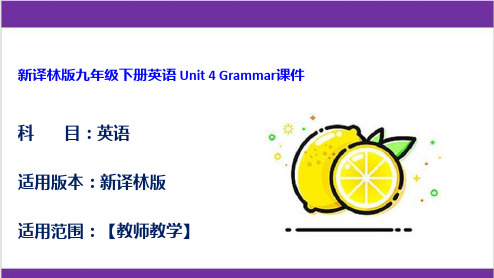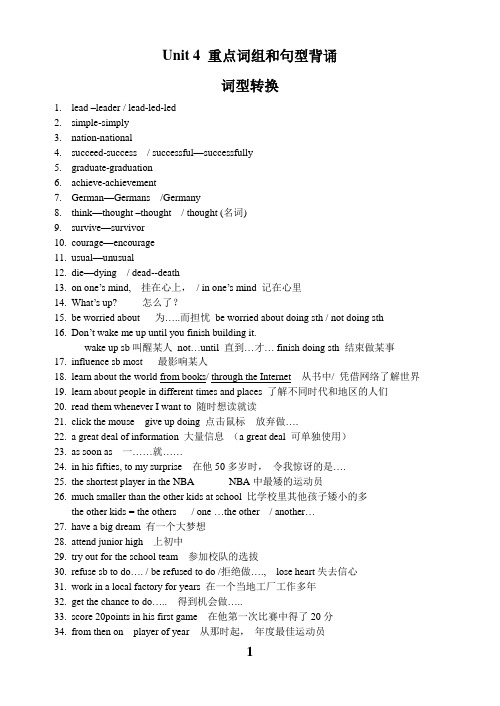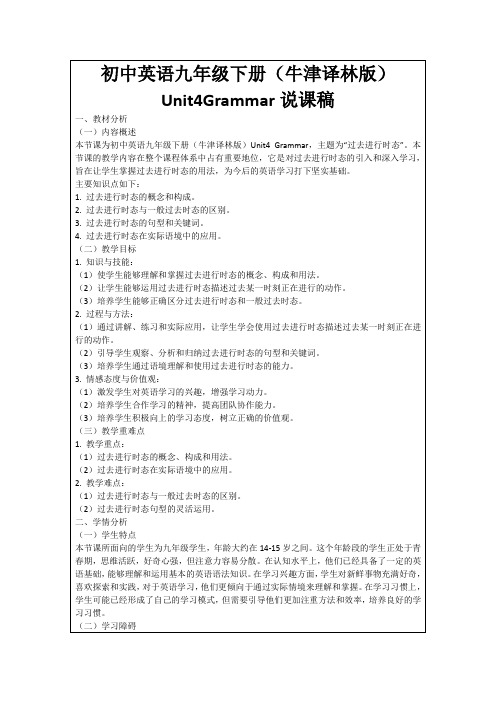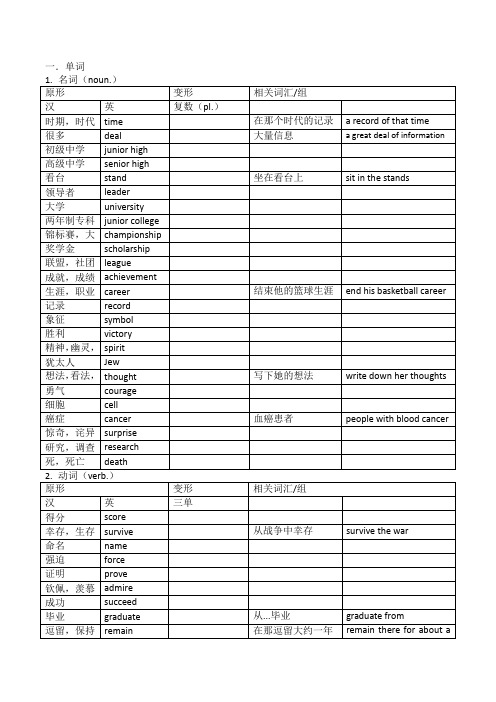九年级上册英语Unit 4 Grammar语法讲解-译林版
新译林版九年级下册英语 Unit 4 Grammar课件

Yuri Gagarin became the first man to go into outer space
____________________________.
3.Pewohpelenmhieghwtams o2v7e to another planet in the future because the
新译林版九年级下册英语 Unit 4 Grammar课件
科 目:英语 适用版本:新译林版 适用范围:【教师教学】
Unit 4 Life on Mars
Grammar
第一页,共三十二页。
新课讲解
状语从句和简单句之间的转换 我们可以用介词短语把状语从句转换为简单句。
1. because 引导的原因状语从句用短语because of可转换成简单句。
on Mars.
第十五页,共三十二页。
新课讲解
Many people are sure that some plants can produce enough water on mars, aren’t they?
No, nobody is sure _w__h_e_t_h_e_r_a_n_y__p_la_n__ts_c_a_n__p_r_o_d_u_c_e___ e_n_o_u_g_h_w__a_te_r_____________________ on Mars or not.
第十二页,共三十二页。
新课讲解
Many people believe (that) we will live on the planet Mars by the year 2100.(改为否定句) Many people don’t believe (that) we will live on the plan√et Mars by the year 2100. Many people believe (that) we will not live on the planet Mars by
牛津译林版九年级英语上册9A unit4 重点词汇、词组小结

Unit 4 重点词组和句型背诵词型转换1.lead –leader / lead-led-led2.simple-simply3.nation-national4.succeed-success / successful—successfully5.graduate-graduation6.achieve-achievement7.German—Germans /Germany8.think—thought –thought / thought (名词)9.survive—survivor10.courage—encourageual—unusual12.die—dying / dead--death13.on one’s mind, 挂在心上,/ in one’s mind 记在心里14.What’s up? 怎么了?15.be worried about 为…..而担忧be worried about doing sth / not doing sth16.Don’t wake me up until you finish building it.wake up sb叫醒某人not…until 直到…才… finish doing sth 结束做某事17.influence sb most 最影响某人18.learn about the world from books/ through the Internet 从书中/ 凭借网络了解世界19.learn about people in different times and places 了解不同时代和地区的人们20.read them whenever I want to 随时想读就读21.click the mouse give up doing 点击鼠标放弃做….22.a great deal of information 大量信息(a great deal 可单独使用)23.as soon as 一……就……24.in his fifties, to my surprise 在他50多岁时,令我惊讶的是….25.the shortest player in the NBA NBA中最矮的运动员26.much smaller than the other kids at school 比学校里其他孩子矮小的多the other kids = the others / one …the other / another…27.have a big dream 有一个大梦想28.attend junior high 上初中29.try out for the school team 参加校队的选拔30.refuse sb to do…. / be refused to do /拒绝做…., lose heart失去信心31.work in a local factory for years 在一个当地工厂工作多年32.get the chance to do….. 得到机会做…..33.score 20points in his first game 在他第一次比赛中得了20分34.from then on player of year 从那时起,年度最佳运动员35.the star of the team 全队的领袖36.sit in the stands 坐在看台上,care for the children 关心孩子们(care about 关心、在意)37.because of his height 因为他的身高(high—height)38.practice even harder 练习得甚至更加用工(even后面加比较级)39.get the coach to change his mind 使得教练改变他的主意40.go on doing / to do 继续做…. go on with sth …41.become leader of the team 变成队伍的领袖42.in his last year of senior high 在他高中的最后一年43.invite him to play basketball 邀请他打篮球44.play at a junior college 在一个专科学院打球45.lead his team to the national championship带领他的队伍到国家级锦标赛(nation—national)46.bring sb to the attention of ……使某人引起……的注意47.seem to be kinder to others than to his own family 比起自己的家人对待别人似乎更友善48.succeed in getting a scholarship 成功获得奖学金succeed in doing sth49.as a result 结果…/ the result of…的结果50.a great player at university 大学里一个伟大的运动员51.play in another basketball league 在另一个篮球联盟打球52.graduate from …从…毕业53.remain there for about a year 呆在那大约一年54.take notice of him.55.lose their parents 失去他们的父母亲56.have many great achievements 有许多伟大的成就57.his proudest moment came 他最骄傲的时刻来了58.through hard work 凭借辛勤的工作59.size and body type 身型60.continue to study 继续做…continue to do / doingGrammar61.go jogging 去漫步62.practice playing basketball / practise doing sth 练习打篮球63.feel tired out 感觉筋疲力尽get excited about sth / doing sth 变得兴奋64.wait at the bus stop 在公交站台等候65.receive a call from my uncle 收到来自叔叔的电话e back from work 下班回来67.be crazy about sth / doing sth 对…着迷68.finish watching my favourite TV programmes 看完我最喜爱的电视节目69.have some money left 有一些钱留下70.try his best to get a ticket 尽全力获得一张票71.be serious about sth 对….认真/严肃/ be serious with sb72.the best Chinese player to ever play in the NBA 曾经在NBA打球当中最好的中国运动员73.the best moment in his career 他职业中最好的时刻74.a game against Class 5 / fight against 抗击/ be against the law 违法stand against the wall 斜靠在墙边75.return to China 回到中国76.one of the Chinese athletes 某一个中国运动员77.end his basketball career 结束他的篮球生涯78.do more charity work 做更多的慈善工作79.especially for poor Chinese teenagers 特别为贫穷的中国青少年Integrated skills80.break out (主动) 爆发break down 抛锚break into 闯入…81.lose their lives during the war 在战争中失去他们的生命82.translate….. into ……把……翻译成……83.people all over the world 全世界的人们84.a record of that time 那个时代的一个记录85.a symbol of the victory of human spirit 人类精神胜利的象征86.be born in Germany 出生在德国87.go into hiding in her father’s office 躲在她父亲的办公室be caught 被抓住88.be sent to a Nazi camp 被送往一个纳粹营89.her elder sisiter collect her diary 她得姐姐收集她得日记90.die of illness死于内因die from…死于外因live in peace 生活在和平中91.have her diary published 把她的日记出版了have sth done / have sb do/ done 把某事给做了,使某人做某事/被做92.be forced to move to another country 被逼搬到另一个国家93.keep writing in her diary 在她的日记中一直写94.a few months later 几个月后95.give it to someone in need 把它给需要帮助的人96.write down her thoughts 写下她得想法97.I hope war never happens again. 我希望战争永远不要再发生98.a story about a 12-year-old boy 有关一个12岁男孩的故事99.get away from…. 从…逃离…..100.donate his body for medical research after his death 在他死后捐献他的身体给医学研究101.a young homeless boy 一个年幼的无家可归的男孩102.survive the war with his friends 和他的朋友从战争中幸存下来survive the war survive the earthquake103.admire these children for their courage 钦佩这些孩子因为他们的勇气104.enjoy a happy life just as we do 就像我们一样享受开心的生活105.donate blood cells to people with blood cancer 献血细胞给患癌症的人106.in other parts of the world 在世界的其他地区107.live in fear of their lives 生活在对生活的恐惧中in fear of… / for fearhave a heart full of love 有一颗慢慢的爱心e across new words 遇到新的单词109.remain the same 保持一样110.a true experience 一个真实的经历111.be away from the outside world 与外面的世界脱轨112.sell well 畅销113.give it to someone in need 把它给需要的人need doing 需要被做/ need to do 需要去做114.medical research 医学研究/ do research on 做…的研究115.people with blood cancer 患血癌的人116.after his death 在他死后117.be kind to others 对别人善良。
Unit4ExploringpoetryGrammarUsage讲解课件高中英语牛津译林版(2020

e.g. * It is no good pretending to know what you do not know.
* It is no use complaining.
动词-ing形式作主语表示一般的或抽象的习惯性的行为; 不定式作主语往往表示具体的、一次性的或特指的动作。
e.g. *Susan came to see me. *She lived to be one hundred. *I sat there waiting for him. *Compared with you, we should work harder than before. *Deeply moved, I decided to follow his example.
动词不定式作定语常表示将要发生的事,动词-ing形式 作定语表示正在发生的事,动词-ed形式常表示已经发生 的事或表示被动意义。
e.g. *I have a meeting to attend tomorrow. *The boy standing there is my friend. *Jack cleared the fallen leaves on the ground. *Many students like to read novels written in English.
4 非谓语作定语:动词不定式、动词-ing形式与动词-ed形式
When used as attributive, to-infinitives often express what will happen, verb-ing forms often express what is happening, and verb-ed forms often express what has happened or express a passive meaning.
初中英语九年级下册(牛津译林版)Unit4Grammar说课稿

在教学过程中,可能预见的问题包括学生对过去进行时态与一般过去时态的混淆,以及对实际语境中时态运用的不理解。我将通过以下方式应对这些问题:
1.在课堂上提供更多的实际语境示例,帮助学生辨别不同时态。
2.设计针对性的练习,让学生在练习中逐渐掌握过去进行时态的用法。
课后,我将通过学生的课堂表现、作业完成情况和学生的反馈来评估教学效果。具体的反思和改进措施包括:
主要知识点如下:
1.过去进行时态的概念和构成。
2.过去进行时态与一般过去时态的区别。
3.过去进行时态的句型和关键词。
4.过去进行时态在实际语境中的应用。
(二)教学目标
1.知识与技能:
(1)使学生能够理解和掌握过去进行时态的概念、构成和用法。
(2)让学生能够运用过去进行时态描述过去某一时刻正在进行的动作。
4.活动区域:底部预留空间,用于课堂活动时的板书记录,如角色扮演的对话。
板书风格将简洁明了,使用清晰的字体和大小,确保每个学生都能阅读。我会使用不同颜色的粉笔区分不同内容,以突出重点和难点。板书在教学过程中的作用是帮助学生把握知识结构,提供视觉上的学习线索。为确保板书清晰简洁,我会在课前准备详细的板书草图,并在课后进行反思,根据学生的反馈进行调整。
五、板书设计与教学反思
(一)板书设计
我的板书设计注重清晰性、简洁性和逻辑性。布局上,我将采用以下结构:
1.标题区域:板书顶部写上课题“过去进行时态”,清晰标识教学内容。
2.知识点区域:左侧列出本节课的主要知识点,如过去进行时态的定义、构成、用法和关键词。
3.例句区域:右侧展示一些典型例句,帮助学生直观理解过去进行时态的应用。
1.分析学生的作业,了解他们的掌握程度,针对性地提ห้องสมุดไป่ตู้额外辅导。
九年级上册英语Unit 4 Grammar语法练习-译林版(含答案)

Unit 4Grammar练习:( ) 1. I will go home for the vacation as soon as I ________ my exams.A. will finishB. finishC. am finishingD. finished( ) 2. I _______ to you as soon as I get there.A. will write B wrote C write D. have written( ) 3. Linda was just going out shopping _______ the telephone rang.A. whileB. whenC. afterD. because( ) 4. You should make a good plan _______ you do anything important.A. beforeB.afterC. thoughD. until( ) 5. I won't believe that little Bob can run 100 metres in 15 seconds _______ I see it with my own eyes.A. untilB.afterC. whenD. if( ) 6. What have you been doing _______ I met you last month?A. sinceB. forC. atD. in( ) 7. Don’t leave until he _______ back.A. have comeB. comesC. will comeD. came( ) 8. Boys and girls, calm down and focus on the test paper _________ you begin to think about the answers. Be confident. You can do it!A. as ifB. as soon asC. although( ) 9.--Always look around _______ you cross the street, David.--OK. I know, Mum.A. untilB. beforeC. unless( ) 10.--The local living conditions have improved a lot _______China set up the city of Sansha. --And more and more people would like to go there forbusiness.A. beforeB. whenC. sinceD. after( ) 11.Amy was reading a book______ I came in.A. whenB. whileC. becauseD. though( ) 12. I will wait _____ I hear from you.A. untilB. sinceC. whileD. because( ) 13.I'll go to visit my aunt in England _______the summer holiday start.A. whileB. sinceC. untilD. as soon as( ) 14.--You have been in Nanjing very long?--Yeah._______ my parents came here.A. ForB.AsC. WhenD. Since( ) 15.Many people do not realize the importance of health _______ they havefallen.A. untilB. whileC. whenD. after( ) 16.You'd better make a good plan ______ you take a holiday.A. beforeB. duringC. untilD. after( ) 17.______ I got back, I found my mother cooking for me.A. WhenB. BeforeC. SinceD. Although( ) 18.________ the children have fun ,parents can take dance lessons on the beach.A.AsB. IfC. WhileD. Once( ) 19.Because of the heavy traffic,it was already time for lunch break she got to her office.A.sinceB.thatC.whenD.until( ) 20.John thinks it won’t be long he is ready for his new job.A. whenB. afterC. beforeD. since( ) 21.We were swimming in the lake_____ suddenly the storm started.A. whenB. whileC. untilD. before( ) 22.It was evening____ we reached the little town of Winchester.A. thatB. untilC. sinceD. before( ) 23.You can eat food free in my restaurant _____you like.A. wheneverB. whereverC. whateverD. however ( ) 24.Scientists say it may be five or six years_ _____it is possible to test this medicine on human patients.A. sinceB. afterC. beforeD. when( ) 25.We told that we should follow the main road_____ we reached the central railway station.A. wheneverB. untilC. whileD. wherever( ) 26.It is almost five years ____we saw each other last time.A. beforeB. sinceC. afterD. when( ) 27.Simon thought his computer was broken______ his little brother pointed out that he had forgotten to turn it on.A. untilB. unlessC. afterD. because( ) 28.The American Civil War lasted four years_____ the North won in the end.A. afterB. beforeC. whenD. then( ) 29.--Did Jack come back early last night?--Yes. It was not yet eight o'clock _____he arrived home.A. beforeB. whenC. thatD. until( ) 30.“You can't have this footba ll back _____you promise not to kick it at my cat again.” the old man said firmly.A. becauseB. sinceC. whenD. until( ) 31.I had just stepped out of the bathroom and was busily drying myself with a towel ____I heard the steps.A. whileB. whenC. sinceD. after( ) 32.--How long do you think it will be ___China sends a manned spaceship to the moon?--Perhaps two or three years.A. whenB. untilC. thatD. before( ) 33.--Why didn't you tell him about the meeting?--He rushed out of the room ____I could say a word.A. beforeB. untilC. whenD. after( ) 34. She had just finished her homework ________her mother asked her to practise playing the piano yesterday.A.whenB.WhileC.afterD.since( ) 35. It just isn’t fair ______I was working as a waiter last month,my friends were lying on the beach.A.wheneverB.ThoughC.forD.while( ) 36. Peter was so excited ________he received an invitation from his friend to visit Chongqing.A.whereB.ThatC.WhyD.when( ) 37. We had to be patient because it ________some time ________we got the full results.A.has been;sinceB.had been;untilC.was;afterD.would be;before 【答案】:1-5BABAA 6-10ABBBC 11-15AADDA 16-20AACCC21-25ADACB 26-30BABBD 31-37BDA ADDD。
Unit4单元知识点牛津译林版英语九年级上册

research
死,死亡
death
2.动词(verb.)
原形
变形
相关词汇/组
汉
英
三单
得分
score
幸存,生存
survive
从战争中幸存
survive the war
命名
name
强迫
force
证明
prove
钦佩,羡慕
admire
成功
succeed
毕业
graduate
从...毕业
graduate from
succeed in doing sth
参加...选拔
try out for sth
注意,察觉
take notice of
促使某人改变主意
get sb to change his mind
使某人引起...注意
bring sb to the attention of
爆发
break out
感到精疲力尽
feel tired out
whenever
尽管,虽然
although
以,凭借
through
对抗,与…相反,违反
against
在对抗..的比赛中
in a game against
仅仅,简直
simply
二.词组
原形
汉
英
汉
英
挂在心上;惦念
on one’s mind
泄气,灰心
lose heart
一...就
as soon as
成功地做某事
sit in the stands
领导者
leader
大学
译林版九年级英语上册unit4知识点

译林版九年级英语上册unit4知识点Unit 4 Knowledge Points in Grade 9 English TextbookIntroduction:In the ninth grade English textbook published by the Yilin Press, Unit 4 covers several important knowledge points. This unit focuses on various topics such as food, nutrition, and health. In this article, we will explore these knowledge points in-depth and discuss their significance in students' language learning.Food and Nutrition:Food plays a vital role in our daily lives, providing us with the necessary nutrients for growth, energy, and overall well-being. Unit 4 introduces key vocabulary related to food and nutrition, such as "carbohydrates," "proteins," and "vitamins." By learning these terms, students develop a more comprehensive understanding of the importance of maintaining a balanced diet.Health and Lifestyle:Unit 4 also delves into the concept of health and lifestyle. It encourages students to reflect on their habits and make better choices regarding their well-being. The unit introduces vocabulary related toexercise, such as "aerobic," "flexibility," and "endurance." By incorporating these terms into their vocabulary, students can better express their opinions on health-related issues and engage in discussions about maintaining a healthy lifestyle.Dialogue Practice:To reinforce the vocabulary and grammar concepts learned throughout the unit, the Yilin Press textbook provides ample dialogue practice. These dialogues are aimed at improving students' listening and speaking skills, allowing them to apply what they have learned in real-life scenarios. By practicing these dialogues with classmates or teachers, students can enhance their fluency and confidence in using the English language.Reading Comprehension:Unit 4 includes various reading passages that expose students to a wide range of topics related to food, health, and nutrition. These passages not only build students' reading comprehension skills but also expand their general knowledge. Through reading, students learn about different eating habits, the benefits of organic farming, and the impact of fast food on our health. This exposure to diverse themes enhances their language learning experience and broadens their perspectives.Grammar Focus:Alongside vocabulary and reading comprehension, grammar is another crucial aspect covered in Unit 4. The Yilin Press textbook introduces grammar topics such as "passive voice," "reported speech," and "adjective clauses." Mastering these grammar points enables students to construct more complex and advanced sentences while expressing their ideas and opinions accurately.Writing Exercises:Unit 4 also provides practice exercises focused on improving students' writing skills. These exercises range from short paragraphs to longer compositions, allowing students to practice expressing their thoughts in a cohesive and coherent manner. The writing tasks often relate to the unit's theme, encouraging students to apply their knowledge of food, health, and nutrition in a practical context.Conclusion:Unit 4 of the ninth-grade English textbook by the Yilin Press is a comprehensive and engaging unit that covers essential knowledge points related to food, nutrition, health, and grammar. By exploring these topics, students not only enhance their language skills but also gain valuable insights into leading a healthy lifestyle. Through dialogue practice, reading comprehension, and writing exercises, studentsdevelop a well-rounded proficiency in English, setting a solid foundation for their future language learning endeavors.。
牛津译林版英语7AUnit4Grammar优秀教学案例

1.学生能够掌握一般现在时态的构成(主语+动词原形),理解其用法和辨析。
2.学生能够运用一般现在时态描述自己的日常活动和他人的一般特征。
3.学生能够理解一般现在时态的概念,并在实际情景中进行交际。
(二)过程与方法
1.通过任务型教学法,让学生在真实情境中感知和理解一般现在时态的构成和用法。
在教学过程中,我采用了任务型教学法,以学生为主体,注重培养学生的口语表达能力和思维能力。在导入环节,我通过展示图片和提问的方式激发学生的兴趣,引导学生思考和讨论。在呈现环节,我使用多媒体课件和实物展示一般现在时态的构成和用法,让学生在真实情境中感知和理解一般现在时态。在练习环节,我设计了一系列口语和书面任务,让学生在实践中运用一般现在时态,巩固所学知识。在反馈环节,我及时给予学生评价和反馈,鼓励他们积极参与课堂活动,提高他们的自信心。
4.反思与评价注重反馈:教师引导学生对课堂教学进行反思,总结自己在学习过程中的收获和不足,明确下一步的学习目标。同时,教师对学生的学习成果进行评价,关注学生的知识掌握和能力提高,给予合理的反馈和建议。通过反思与评价,学生能够更好地了解自己的学习状况,提高学习效果。
5.教学策略灵活多样:教师在教学过程中运用了情景创设、问题导向、小组合作等多种教学策略,使课堂变得生动有趣,激发了学生的学习兴趣和积极性。同时,教师注重培养学生的口语表达能力和思维能力,提高了学生的学习效果。
3.引导学生认识到学习英语的重要性,提高他们的语言素养。
4.培养学生关心他人,善于观察和思考的能力,培养他们的责任感。
作为一名特级教师,我深知教学目标的重要性,它不仅是教学活动的出发点和归宿,也是评价教学效果的重要依据。在制定教学目标时,我注重将知识与技能、过程与方法、情感态度与价值观三者相互融合,形成一个全面、立体的教学目标体系。通过这样的教学目标,我希望能够激发学生的学习兴趣,培养他们的自信心和团队合作精神,使他们能够在掌握一般现在时态的语法知识的同时,提高他们的口语表达能力和思维能力。同时,我也希望通过教学,让学生认识到学习英语的重要性,培养他们的责任感,使他们能够更好地面对未来的挑战。
- 1、下载文档前请自行甄别文档内容的完整性,平台不提供额外的编辑、内容补充、找答案等附加服务。
- 2、"仅部分预览"的文档,不可在线预览部分如存在完整性等问题,可反馈申请退款(可完整预览的文档不适用该条件!)。
- 3、如文档侵犯您的权益,请联系客服反馈,我们会尽快为您处理(人工客服工作时间:9:00-18:30)。
Unit 4
Grammar
注意回顾学习before, after, when 和while
before和after引导的时间状语从句
Before是主句动作发生在从句的前面。
注意before引导的从句不再用否定式的谓语,并且当before引导的从句位于主句之后,有时译成“就,才”。
还要注意主句和从句之间的时间关系。
当主句用将来时,从句总是用现在时;如果before引导的从句谓语用的是过去时,则主句动词多用过去完成时,这样以便体现动作发生的先后。
After表示主句动作发生在从句动作之后。
主句和从句的动作的时间关系正好与before引导的从句相反。
例如:
It will be four days before they come back. 他们要过四天才能回来。
Einstein almost knocked me down before he saw me.
爱因斯坦几乎把我撞倒才看到我。
My father had left for Canada just before the letter arrived.
我父亲恰好在信到之前去加拿大了。
They had not been married four months before they were divorced.
他们结婚还不到四个月就离婚了。
After you think it over, please let me know what you decide.
你仔细考虑过以后,告诉我你是怎样决定的。
After we had finished the work, we went home.
完成工作之后,我们回家了。
(从句用过去完成时,主句用一般过去时)
when 的用法
如果只从现象来看,when 从句用的最多的是一般过去时,而主句的时态没有限制,根据具体情况而定。
1. When he was a child he was always trying out new ideas.
他小时候就常常试验一些新的设想。
2. When she came into my room, I was just reading a book.
她走进我房间时,我正在看书。
3. Were you writing when the teacher came in?
老师进来的时候,你在写信吗?
4. Sorry, I was out when you called me.
对不起,你打电话来的时候我出去了。
5. He was on the point of leaving when someone knocked at the door.
他正要走,这时有人敲门。
6. I thought of it just when you opened your mouth.
就在你要说话的时候,我也想到了。
7. I had hardly[scarcely] closed my eyes when someone knocked at the door.
我刚一闭上眼,就有人在敲门了。
实际上,when 从句也可以有其它的时态,但几乎也不用进行时,因为它也只是作为一个时间参照点。
例如:
When I got to the airport, the guests had left.
当我赶到飞机场时,客人们已经离开了。
When he had finished his homework, he took a short rest.
当他完成作业后,他休息了一会儿。
Why do you want a new job when you have got such a good one
already?
你已经找到如此好的工作,为何还想再找新的?
You shall borrow the book when I have finished reading it.
在我读完这本书后,你可以借阅。
while 的用法
相比于when 来说,while 从句的侧重点就不一样了。
while 从句的侧重点在于描述动作正在发生的状态,它的意思是:当while 事件正在发生的时候,另一件事如何如何。
所以,while 从句一般用的是正在进行时。
而另一件事的状态没有硬性的要求,根据具体情况而定。
例如:
1. While my wife was reading the newspaper, I was watching TV.
当妻子正在看报纸的时候,我正在看电视。
2. While Jim was mending his bike, Lin Tao came to see him.
正当吉姆修自行车时,林涛来看他。
3. While they were talking, the bell rang.
正在他们谈话的时候,上课铃响了。
4. You can’t do your homework while you’re watching TV.
你不能一边看电视一边做家庭作业。
5. While John was sitting biting his nails, I was working out a plan to get us
home.
约翰坐在那里咬指甲时,我正在制定一个回家的计划。
I felt tired out. The best moment in his career was in 2004 - he scored 41 points in a game against the Atlanta Hawks.
回顾tired out 和against 的用法
against prep. 反对,违反;靠;倚;防备adj. 不利的;对立的
【补充与against相关的搭配】
be against 反对;
go against 反对,不利于;
against one's will/wishes违背某人的意愿;
against a rainy day 未雨绸缪
练习:
Are you against it or for it? 你对此事是反对呢还是赞成?
She leaned lightly against his shoulder.她轻轻地靠在他的肩上。
